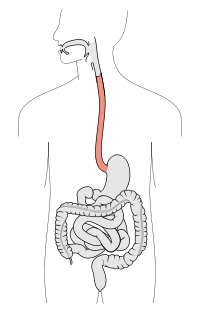
Photo from wikipedia
Endoscopic findings in early esophageal cancer are often subtle and require careful inspection and meticulous endoscopic examination. When dysplasia is suspected, we recommend performing 1 or 2 targeted biopsies of… Click to show full abstract
Endoscopic findings in early esophageal cancer are often subtle and require careful inspection and meticulous endoscopic examination. When dysplasia is suspected, we recommend performing 1 or 2 targeted biopsies of the abnormal area and review with a pathologist specialized in evaluating gastrointestinal diseases. In the case of adenocarcinoma, after resection of any visible cancer, residual Barrett's can be treated by ablation. Endoscopic resection can offer the opportunity for patients to avoid surgery. Further studies are needed to evaluate the optimal management of circumferential and near-circumferential lesions as well as tools and techniques to facilitate the performance of endoscopic submucosal dissection and endoscopic mucosal resection.
Journal Title: Gastroenterology clinics of North America
Year Published: 2021
Link to full text (if available)
Share on Social Media: Sign Up to like & get
recommendations!